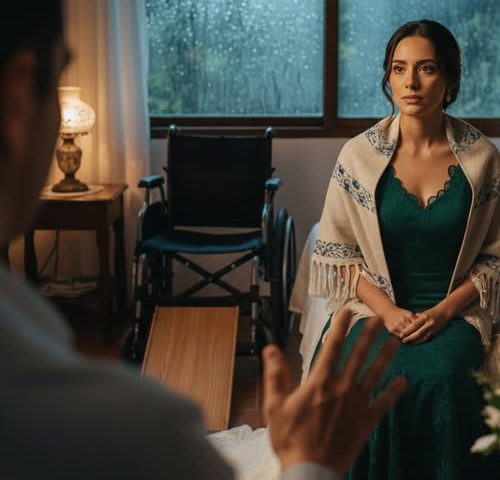In a small neighborhood in southern Puebla lived Hugo Ramírez, a thirty-five-year-old bricklayer known for his simplicity, his kindness, and his tireless work ethic.
No one in the neighborhood could have imagined that one day he would do something that would leave everyone speechless: he announced he would marry a woman in a wheelchair.
Her name was Lucía Álvarez—a woman with a sweet face and honey-colored eyes, who before the accident had been the beauty queen of the Puebla Teachers’ College. Three years earlier, a crash on the Mexico–Cuernavaca highway robbed her of the use of her legs… and also her dream of becoming a teacher.
Neighbors were quick to murmur:
“Is that Hugo crazy or something? He’s going to spend 300,000 pesos to marry a woman who can’t even walk!”
Some said it with pity. Others, with cruel laughter.
But Hugo didn’t respond. He just smiled, with that calmness that seemed to come from another world.
And when they posed together for their engagement photos, he took Lucía’s hand and whispered:
“If you can’t get up, then I’ll stay seated with you. We’ll walk together, in a different way.”
Lucía cried like a child. For the first time in three years, she didn’t feel like a burden, but a person worthy of being loved.
Lucía’s family, especially her mother, strongly opposed this.
Doña Teresa, a strong-willed woman of Catholic faith, burst into tears:
“My child, think! You can’t give him children, you can’t work. Why let a good man ruin his life for you?”
Lucía, weak but firm, responded:
“Mom, he doesn’t see me as a problem. He sees me as his destiny.”
Their persistence softened their hearts.
And so, one Sunday in May, in a small white church decorated with bougainvillea, Lucía and Hugo were married, surrounded by the aroma of sweet bread and the guitars of a local trio.
Hugo used all his savings—more than 300,000 pesos, the result of ten years of work on construction projects across the country—to rebuild their house.

He built ramps, widened doors, adapted the bathroom, and installed railings so Lucía could move around without depending so much on him.
He even built a small terrace where she could paint while he worked.
“I want you to feel like this house is yours too,” he told her, wiping the sweat off her face with a dusty hand.
Lucía smiled through her tears. For the first time, the future no longer held any fear for her.
Their wedding night arrived with a light rain.
The newly remodeled room smelled of new wood and jasmine flowers. Hugo nervously helped Lucía sit on the bed.
His hands trembled—not with desire, but with tenderness.
When he carefully removed the white lace dress, he stopped.
Not because of the fragility of his wife’s body, but because of the scars: long gray marks running down her back, traces of surgeries, falls, and nights of silent pain.
Hugo didn’t say a word. He just held her tightly, so tightly that her tears fell onto her hair.
“Don’t you regret it?” Lucía asked, her voice barely audible.
“I only regret not having met you sooner… so I could suffer with you less,” he replied.
“You are the greatest prize of my life.”
Lucía cried. That night, there was no compassion, only pure love.
The following days were filled with routines, laughter, and hope.
Hugo would get up before dawn, cook for them both, then take her to the rehabilitation center.
In the afternoons, he would learn new recipes for her or build homemade inventions to make her life easier.
Lucía, for her part, began to paint again.
Her paintings, full of bright colors and butterflies, seemed like a cry of rebirth.
Soon she opened an online workshop for children, which she called “Reborn in Colors.”
Over time, magic happened.
A year later, her feet began to tingle.
Two years later, with the help of canes, she managed to take her first steps.
“The Lottery of the Heart”
When Lucía took three steps toward him, Hugo burst into tears like a child.
Between tears and laughter, she said to him:
“See, love? In the end, you did win the lottery.”
He hugged her and replied:
“And I wouldn’t trade this prize for anything, not even the whole world.”
Since then, every morning in Puebla, the neighbors still see them—he pushing the chair, she walking at her pace—and they all know that sometimes, true luck isn’t won with a ticket, but with a heart that doesn’t give up.
